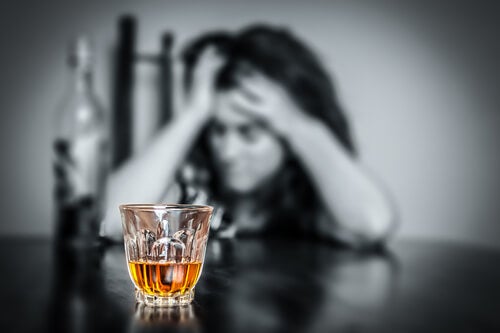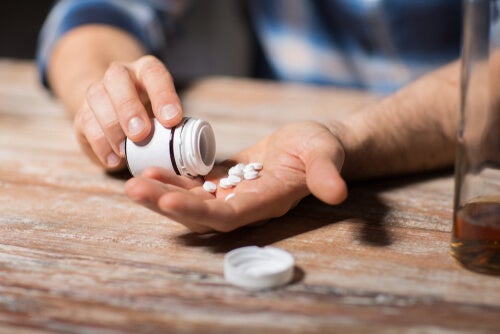Antidepressants and Alcohol: What Are the Risks?

Just about all of us wonder how alcohol interacts with certain kinds of medication. Antidepressants and alcohol are no exception. When it comes to these two, it’s important to remember that they’re both psychoactive substances that can have major effects on your body.
They also happen to be two substances that go together all too often in our society. It’s not unusual to encounter people with clinical depression who drink alcohol or alcoholics who have depression. This is also why it’s worth learning more about what can happen if you combine them. Keep reading to find out.
What’s alcohol and what does it do?
When we talk about alcohol, we’re really talking about ethanol or ethyl alcohol. It’s the only kind we can actually drink. Alcohol is a psychoactive substance that you’ll find in drinks such as wine, beer, liquor, or spirits.
What does it do in your body? It depresses your central nervous system. More specifically, it inhibits your GABA-A receptors for the neurotransmitter GABA (gamma-Aminobutyric acid).

Here are some effects of consuming too much of it:
- Disinhibition, combined with euphoria.
- Drowsiness.
- Dizziness.
- Slower reflexes.
- Slower movements.
Alcohol affects the same neural receptors as a lot of psychotropic medications. This is why it can have such similar effects. One common example of a medication that has similar effects as alcohol is benzodiazepine, an antidepressant.
Antidepressants and alcohol
In general, doctors and pharmacists suggest that you never combine any medications with alcohol. They urge that even more when it comes to alcohol and antidepressants.
As we pointed out above, some antidepressants follow the same neural pathways as alcohol. What that means is that combining them can actually boost their individual effects and have a much stronger impact on your body.
The most significant of those effects is that it leads to a deep depression of your central nervous system. That can lead to an increase in depressive symptoms, along with an increase in disinhibition and violent, uncontrollable behavior. Combining them can also boost these effects:
- Decrease in awareness.
- Increase in drowsiness.
- Decrease in coordination and control over your body.
- Slower reflexes.
- Inhibited memory.
Mixing alcohol and antidepressants will also boost the psychotropic impact on your brain. This is because some antidepressants, such as MAOI’s, prevent the metabolization of alcohol in your liver. In other words, your body can’t process the alcohol and other substances, and that leads to a more intense impact on your central nervous system.
Another significant consequence of mixing them is that it can really worsen the side effects. One of the many examples is a change to your sleep patterns.

Antidepressants to help treat alcoholism
Alcoholism is a complex condition with a lot of factors to consider. As we mentioned above, it also is strongly linked to depression. In fact, a lot of doctors will prescribe things such as anti-anxiety medications and antidepressants to treat the symptoms of alcoholism.
There are also studies on how antidepressants could help people quit tobacco. Some of the drugs they’re using are trazodone, venlafaxine, and fluoxetine (Prozac).
Selective serotonin reuptake inhibitors, or SSRIs, have proven to be effective in treating alcohol withdrawal symptoms. They also seem to help prevent cravings.
Antidepressants can also be helpful if a person finds themselves going through a major depressive episode while trying to treat their alcoholism. There are actually many cases of patients with intertwined depression and alcohol dependency. It’s a major challenge to treat those patients.
As you can see, mixing antidepressants and alcohol can have some serious consequences. It’s important to learn about them and avoid any issues that could come from using them at the same time. When you’re taking any kind of medication, you should always follow your doctor’s instructions and ask questions.
All cited sources were thoroughly reviewed by our team to ensure their quality, reliability, currency, and validity. The bibliography of this article was considered reliable and of academic or scientific accuracy.
- Romero, C., & González, J. B. (2005). Antidepresivos: revisión. Farmacia profesional, 19(10), 76-80.
- Bolet Astoviza, Miriam, & Socarrás Suárez, María Matilde. (2003). El alcoholismo, consecuencias y prevención. Revista Cubana de Investigaciones Biomédicas, 22(1).
- Marusić, Srdan, Thaller, Vlatko, & Javornik, Nenad. (2004). Psicofarmacoterapia en el tratamiento de los trastornos relacionados con el alcohol. The European journal of psychiatry (edición en español), 18(4), 249-258.
This text is provided for informational purposes only and does not replace consultation with a professional. If in doubt, consult your specialist.








